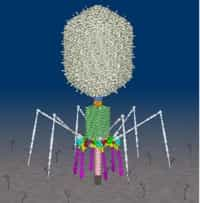It is not weakened and destroys the most aggressive tumors of the breast and ovary: genetically modified, the virus contains an antibody capable of opening the "lock" of tumor cells, attacking them and then becoming extinct when they are exhausted. PNAS reports the success of the in vivo experimentation. The " Samson " of anti-cancer herpes viruses is the result of Italian research. According to the researchers, it is in fact the first non-weakened herpes virus, but genetically modified to destroy tumor cells and spare the healthy ones, to be successful in in vivo tests. "When a virus is genetically manipulated to be able to use it as a weapon against tumors – explains the virologist Gabriella Campadelli-Fiume of the University of Bologna, who led the research – usually it is weakened, to make it harmless towards the host organism and control it better. However, this often ends up making it less aggressive even towards the tumor, and this is one of the reasons why this line of research has not yet resulted in anti-tumor therapies that have entered clinical practice. We have instead chosen a more sophisticated path We have left its virulence unchanged, but we have removed the protein ”˜keys' with which it enters normal cells from the virus, and replaced them with ”˜keys' that allow it access only to diseased cells". The result, as reported by Pnas (the authoritative magazine of the US Academy of Sciences), is an engineered virus capable of destroying the most malignant of breast and ovarian tumors, which every year, in Italy alone, affect 42,000 new people and kill over 10 thousand. The new virus, which the University has already asked to patent, could also successfully counteract the brain metastases of these tumours, which are instead inaccessible even to the most innovative drugs. The "keys" on which the Bolognese researchers intervened are a portion of glycoprotein D with which the herpes simplex virus – known by many as responsible for the characteristic vesicles that appear on the lips in case of flu, stress, weakening, etc. – normally manages to enter healthy cells and destroy them. The researchers removed this piece of viral DNA and replaced it with another "key": an antibody capable of opening the "lock" (receptor) of breast and ovarian tumor cells that produce the Her- 2. It is precisely this molecule, which coats the cancerous cells in question in abundance, that transforms them into a target. In fact, the modified virus attacks only the cells that are covered with it, sparing the others. The infection feeds itself, because the virus progressively replicates until the diseased cells are exhausted. Once the tumor has been eliminated, finding no more cells to settle in, it is destined, according to the researchers, to become extinct, unlike its natural variant which instead remains in a silent form in healthy cells, waiting to manifest itself again at the first opportunity. The effectiveness of the virus was measured on mice, in tests conducted in the laboratories of the Department of Experimental Pathology of the University over the past twelve months. 60 percent of the treated mice are completely cured of the tumor, while in the remaining 40 percent its growth is significantly arrested. Another innovative aspect of the new tumor killer virus is that, as a variant of herpes simplex, which naturally has a predilection for nerve cells, it could prove effective against brain metastases of Her-2 tumors, which instead the main drugs today commonly used in therapies fail to achieve. Furthermore, these drugs tend to stop the growth of the tumor, but not to destroy it, which instead seems to succeed very well with mutated herpes. The next step will be to investigate the possibility of carrying the virus through the circulatory system, in order to intercept any unknown tumor metastases, as well as obviously carrying out human trials. But there is another aspect that is particularly dear to scholars. This experimental success paves the way for other similar genetic manipulations of the herpes virus, providing it, each time, with the appropriate "keys" to the cellular "locks" of other types of cancer.
You may also like
A fruit to fight breast cancer
The extract of bitter melon ( Momordica charantia ), a very common vegetable in India and China, would seem able to promote the death of breast cancer cells and prevent their proliferation. This was discovered by a group of American researchers led by Ratna Ray, a professor at the Department of Pathology at the University… Continua a leggere A fruit to fight breast cancer
From skin odor to cancer diagnosis
Some English scientists have studied for a long time the correlation between the biochemical profile of a person's smell and any pathologies. The skin or rather the information given by the smells have proved useful for the diagnosis of diseases such as cancer , according to what was reported by Paul Thomas of Loughborough University… Continua a leggere From skin odor to cancer diagnosis
Herpes Virus: nanotechnology against cancer
Excluding skin cancers, breast cancer is, in one out of three cases, the type of cancer diagnosed in female patients. Our immune system is designed to fight cancer . T-cells in the human body belong to a group of white blood cells and play a central role in immunity. However, cancer cells cause T-cells to… Continua a leggere Herpes Virus: nanotechnology against cancer
Hallucinogenic mushrooms as psychoactive drugs
An effect of spiritual well-being that lasts over a year after intake. It is caused by hallucinogenic mushrooms, used for millennia in many populations for mystical-religious purposes, but also by young and old in search of alternative experiences to hard drugs . And today the relaxing and anti-anxiety properties of these yeasts are seen in… Continua a leggere Hallucinogenic mushrooms as psychoactive drugs
